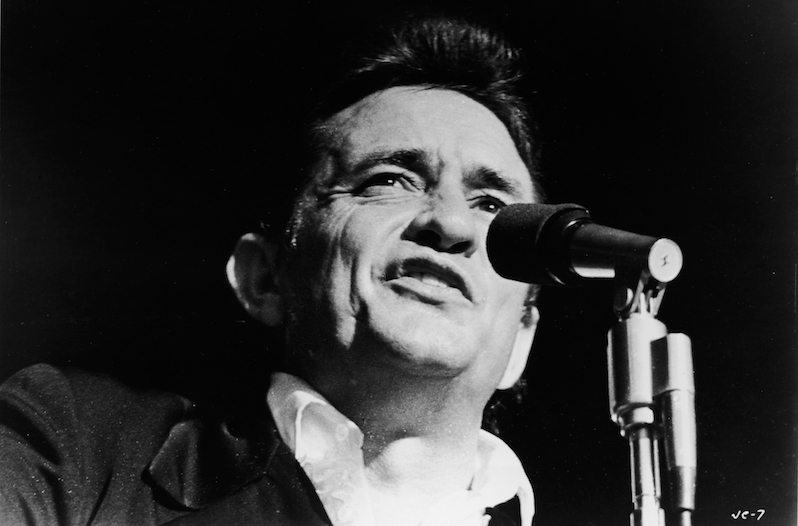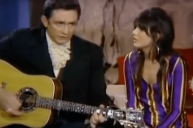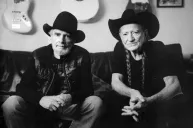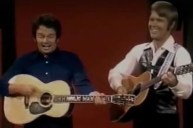The world lost Johnny Cash 14 years ago, on Sept. 12, 2003. But the Man in Black's legacy remains an enduring presence in country music. Born into poverty in Kingsland, Ark. in 1932, Cash went on to become one of the best-selling artists in music history and helped define rockabilly, classic country and the outlaw country movement at various stages of his incredible career. Here are five stories that capture the legacy of Johnny Cash.
Videos by Wide Open Country
5. Patriotic Protests
https://www.youtube.com/watch?v=cPjceZjyhXM
Johnny Cash believed that true patriotism involved speaking up about issues that matter. And that was exactly what Cash did when he met President Nixon in 1972.
Cash met with the president to discuss prison reform, but before the discussion, Nixon had a couple song requests for the singer.
The Man in Black politely declined Nixon's request for Merle Haggard's "Okie From Muskogee" and Guy Drake's "Welfare Cadillac" and instead launched into "What is Truth?," a Vietnam War protest song. Cash followed up with "The Man in Black," a song that summarized his alignment with the poor and oppressed. The final song, "The Ballad of Ira Hayes," deals with the true story of a Native American soldier who went to war only to return home to find little support from the country he served.
It's hard to imagine that Nixon was thrilled with Cash's song choices. But he did learn that Johnny Cash was an outspoken advocate for human rights and not a man who could be bossed around.
4. Billboard Ad
In the mid-90s, Cash teamed up with iconic producer Rick Rubin for the "American Recordings" albums. Cash's album sales had been declining since the 1980s and the first "American Recordings" album was seen as his return to the music scene. Though the album received universal critical acclaim, it was virtually ignored by country radio.
In response to Cash being ostracized from mainstream country, Rubin took out a $20,000 full page ad in Billboard magazine. The ad featured the now-famous photo of Cash flipping off the camera at his 1969 San Quentin concert. The ad read: "American Recordings and Johnny Cash would like to acknowledge the Nashville music establishment and country radio for your support."
3. His Support for Merle Haggard
Johnny Cash has always been associated with outlaws. He pushed for prison reform and famously performed for inmates. While he did find himself on the wrong side of the law at times, the rebellious singer never spent much time behind bars. But he did have a profound impact on another country singer who did.
While he was an inmate at San Quentin, a 20-year-old Merle Haggard saw Cash perform at the prison. Haggard immediately knew what he was born to do.
But upon his release, Haggard carried a lot of shame about his outlaw past and was hesitant to let the public know that he had been in jail. Cash encouraged Haggard to speak publicly about his personal experiences.
Haggard frequently expressed his gratitude for Cash's support and said that he was glad to have the platform to speak publicly about his past before it came out in the press.
2. Breaking Boundaries on 'The Johnny Cash Show'
The Johnny Cash Show was televised from 1969-1971. During its two-year run, Cash showcased country-folk musicians such as Joni Mitchell, Bob Dylan and Linda Ronstadt. The show put an emphasis on great lyricism and artistry, and no one was more deserving of a spotlight than the budding lyrical genius Kris Kristofferson.
In 1971, Cash invited Kristofferson on the show to perform "Sunday Morning Coming Down." Network executives were wringing their hands over the line: "On the Sunday morning sidewalks, wishin' Lord, that I was stoned." They tried to convince Cash to change the lyric to "wishin' Lord, that I was home." But in an act of classic Cash rebellion, the Man in Black held firm.
READ MORE: The Incredible Story Behind "Sunday Morning Coming Down"
1. His Love Letters to June
Johnny and June met backstage at the Grand Ole Opry in 1956. Twelve years later, Cash proposed to June onstage in front of thousands of fans. June helped Johnny battle his demons, helping him to overcome his addiction to drugs and alcohol. When June passed away in 2003, Johnny followed less than four months later. At his final public performance, Cash read a statement about his late wife, stating:
"The spirit of June Carter overshadows me tonight. With the love she had for me and the love I have for her, we connect somewhere between here and Heaven. She came down for a short visit tonight, I guess, from Heaven, to visit with me tonight and give me courage and inspiration, like she always has."
Cash was no stranger to penning beautiful words for his wife. The letter Johnny wrote to June on her 65th birthday was voted the most romantic letter of all time. In the letter, Cash writes:
"You still fascinate and inspire me. You influence me for the better. You're the object of my desire, the #1 Earthly reason for my existence."
Johnny and June continue to inspire great country love songs and are a testament to the power of devoted love.




